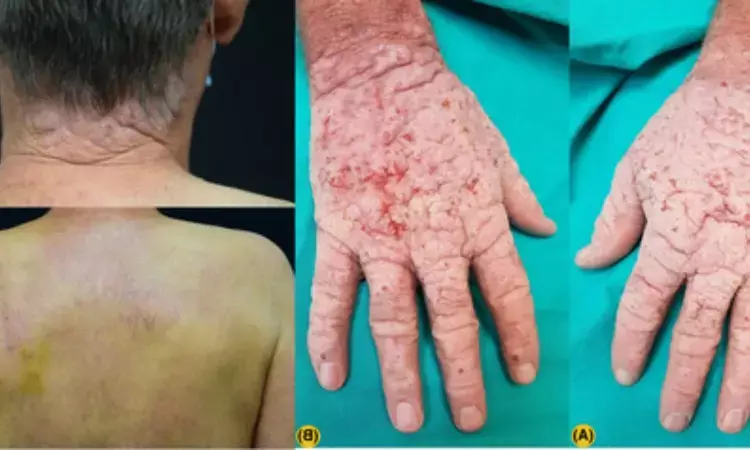- Home
- Medical news & Guidelines
- Anesthesiology
- Cardiology and CTVS
- Critical Care
- Dentistry
- Dermatology
- Diabetes and Endocrinology
- ENT
- Gastroenterology
- Medicine
- Nephrology
- Neurology
- Obstretics-Gynaecology
- Oncology
- Ophthalmology
- Orthopaedics
- Pediatrics-Neonatology
- Psychiatry
- Pulmonology
- Radiology
- Surgery
- Urology
- Laboratory Medicine
- Diet
- Nursing
- Paramedical
- Physiotherapy
- Health news
- Fact Check
- Bone Health Fact Check
- Brain Health Fact Check
- Cancer Related Fact Check
- Child Care Fact Check
- Dental and oral health fact check
- Diabetes and metabolic health fact check
- Diet and Nutrition Fact Check
- Eye and ENT Care Fact Check
- Fitness fact check
- Gut health fact check
- Heart health fact check
- Kidney health fact check
- Medical education fact check
- Men's health fact check
- Respiratory fact check
- Skin and hair care fact check
- Vaccine and Immunization fact check
- Women's health fact check
- AYUSH
- State News
- Andaman and Nicobar Islands
- Andhra Pradesh
- Arunachal Pradesh
- Assam
- Bihar
- Chandigarh
- Chattisgarh
- Dadra and Nagar Haveli
- Daman and Diu
- Delhi
- Goa
- Gujarat
- Haryana
- Himachal Pradesh
- Jammu & Kashmir
- Jharkhand
- Karnataka
- Kerala
- Ladakh
- Lakshadweep
- Madhya Pradesh
- Maharashtra
- Manipur
- Meghalaya
- Mizoram
- Nagaland
- Odisha
- Puducherry
- Punjab
- Rajasthan
- Sikkim
- Tamil Nadu
- Telangana
- Tripura
- Uttar Pradesh
- Uttrakhand
- West Bengal
- Medical Education
- Industry
Case of chronic actinic dermatitis gets successfully treated with alitretinoin: A Report

Spain: A recent case study published in Photodermatology, Photoimmunology & Photomedicine demonstrated alitretinoin as a treatment option for refractory chronic actinic dermatitis patients.
Chronic actinic dermatitis (CAD) is a skin condition characterized by an immune reaction against elicited cutaneous antigens. This reaction results in inflammation of skin areas exposed to sunlight leading to eczema or pruritic rash and to scaling and lichenification in the long term. CAD is an underdiagnosed and infrequent photodermatosis reported primarily in adult men. Its treatment is challenging and often requires immunosuppressive medications.
Francisco J. Navarro-Triviño and colleagues from Spain present the case of a patient with refractory chronic actinic dermatitis (CAD) that was successfully treated with alitretinoin 30 mg daily.
"This is the first report to our knowledge to address the suitability of this retinoid specifically for chronic actinic dermatitis," the research team wrote. "Given its acknowledged safety and efficacy, we consider that it might play an important role in treating this condition, although more studies are required."
The case concerns a 62-year-old construction worker who presented with severe hyperkeratotic plaques in sun-exposed areas. He had been suffering from chronic lesions on the dorsal side of his elbows, knees, hands, and upper back for 12 years that progressively became lichenified. Over the holidays, his condition was reported to worsen drastically, including an erythrodermic episode at the onset of the disease, which happened over the summer.chronic actinic dermatitis with alitretinoin
Following the diagnosis of CAD, the patient started a hardening regimen with UVA1 phototherapy, which had to be abruptly stopped due to excessive erythema and incoercible pruritus right after the sessions. The team prescribed azathioprine 2 mg/kg daily apart from topical corticosteroids, sun avoidance measures, strict solar protection, and emollients. This treatment had to be suspended within one month following severe hypertransaminasemia.
Methotrexate 15 mg a week led to severe gastrointestinal side effects. Acitretin improved with dosing of 25 and 35 mg daily but was abandoned after two months due to uncontrollable headaches. Alternatively, alitretinoin 30 mg daily was prescribed, which provided significant symptomatic relief and improved his poikilodermatous appearance.
The patient's condition is entirely resolved eight months after the initiation of the treatment, with no analytical or clinical side effects.
Despite being a challenging condition to diagnose, the research team stresses making all reasonable efforts to accurately differentiate it from other dermatoses in which cytokines profile and the underlying pathophysiology would require more specific treatments for the respective targets.
"Alitretinoin might be especially interesting in the case of CAD refractory patients with poikilodermatous appearance and lichenification rather than eczematous presentations," they concluded.
Reference:
Prados-Carmona, A., Ruiz-Villaverde, R., Aranda, G., Arjona, J. A., & Navarro-Triviño, F. J. Successful treatment of chronic actinic dermatitis with alitretinoin: Should retinoids be included in the therapeutical arsenal? Photodermatology, Photoimmunology & Photomedicine. https://doi.org/10.1111/phpp.12888
Dr Kamal Kant Kohli-MBBS, DTCD- a chest specialist with more than 30 years of practice and a flair for writing clinical articles, Dr Kamal Kant Kohli joined Medical Dialogues as a Chief Editor of Medical News. Besides writing articles, as an editor, he proofreads and verifies all the medical content published on Medical Dialogues including those coming from journals, studies,medical conferences,guidelines etc. Email: drkohli@medicaldialogues.in. Contact no. 011-43720751


